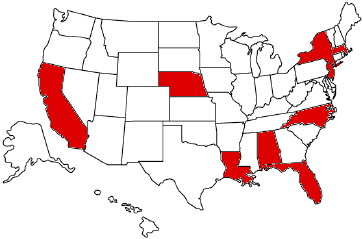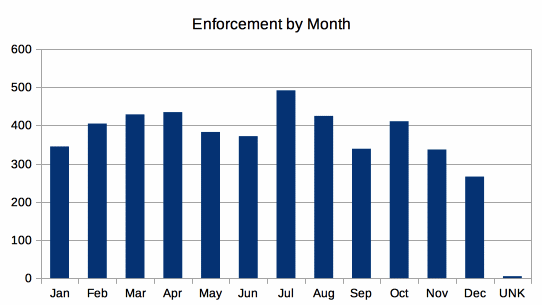Our mid-year update to the Enforcment Action Database shows absolutely no change in the FCC’s enforcement protocol regarding unlicensed broadcasting. Although the agency is running ahead of its enforcement action pace last year (70 to date, compared to 125 for all of 2015), it’s well off the highs seen late last decade. Fewer than three dozen unlicensed radio stations in just six states have had some form of contact with the FCC in 2016.
 So far, Florida is the hottest spot for FCC activity with 25 actions to date; New Jersey and New York respectively round out the top three. That’s a surprising drop for the Empire State, which has not only topped the list for the last four years but whose Congressfolk and licensed broadcast constituency (along with their colleagues in New Jersey) have been clamoring for more anti-pirate policing.
So far, Florida is the hottest spot for FCC activity with 25 actions to date; New Jersey and New York respectively round out the top three. That’s a surprising drop for the Empire State, which has not only topped the list for the last four years but whose Congressfolk and licensed broadcast constituency (along with their colleagues in New Jersey) have been clamoring for more anti-pirate policing.
Some of this political pressure may have been a factor in three monetary forfeitures issued to New Jersey pirates last month. Industry trades made great hay out of the $40,000 in total penalties — but all of these stem from cases that originated last year. That said, the FCC handed out just a single forfeiture in 2015, but perennial collection difficulties remain.
Considering there has been some FCC field activity outside of the hot-spots, in places such as Alabama and Louisiana, it’s a safe assumption that the overall level of unlicensed broadcast activity remains vibrant nationwide…it’s just a question of whether or not FCC field agents have the time and will to go after pirate stations. Generally speaking, the answer to this would be “no,” except in those cases where they cannot be ignored. Things remain complaint-driven, and when a field office gets around to it (typically on the same days of the month, regardless of the office) they will confirm the station’s existence and address, then begin the paper-chase.
Where are the Enforcement Bureau’s vaunted “Tiger Teams”? Have they even been populated and trained up yet? It’s been nearly a year since the FCC issued its order to reconfigure the Bureau’s field resources. Federal civil service rules consigned the personnel-shuffle to take months (or longer) and the process is constrained by austerity-era budgets — though the assumption was that downsizing the FCC’s field presence and creating the tiger teams as a backstop as would be a net money-saver. Three-quarters of fiscal year 2016 is already in the books.
 However, we are heading into what is historically the most active anti-pirate enforcement month of the year. This means nothing, though, if the agency simply lacks the structure and organization to flex what pitiful muscle it has left.
However, we are heading into what is historically the most active anti-pirate enforcement month of the year. This means nothing, though, if the agency simply lacks the structure and organization to flex what pitiful muscle it has left.
With party conventions and elections looming, it’s highly unlikely that Congress will get around to awarding any supplementary enforcement tools to the agency beforehand, and with a change in presidential administration on the horizon Chairman Tom Wheeler might very well like to leave this entire issue for his successor to sort out. Nobody’s ever been burned by vigilance — that remains the watchword of the scene.
Skip to content